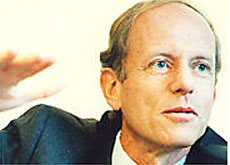Where angels thrive

Looking at Swiss information technology companies that raised capital from outside investors last year, it seems that business angels or private, high net worth individuals are back on the scene.
It is a good thing too because the venture capital investors are not.
Angel investors are active in the information technology sector in Switzerland giving young companies, too small or too risky for venture capital investors, the needed cash to develop the business.
Startup companies, such as TelcoPay AG, AlpVision SA, SVOX AG, Seclutions AG, e-enterprise, and Aibits SA are just some of the firms that tapped into business angel networks to raise tens of millions of francs in working capital this year.
As a result, they have created more than a hundred new jobs at a time when many other firms are laying people off.
Is there a return of the business angel?
There is no “return of the business angel” because the angel type investor never really went away, thinks Hans van der Berg, a senior partner at Venture Partners AG in Zurich and a member of the network, Business Angels Club.
“The business angel culture that started here two or three years ago persists and has survived,” van der Berg added.
A number of the networking organisations founded during the tech stock boom that meant to match capital with private businesses remain in place. Brains-to-Ventures, with its strong ties to Munich area angels and venture capitalists, Band of Angels Switzerland (BOAS), which has close to fifty members. In addition, Venturix in Solothurn says it is still matching private money with businesses that need it.
In the Geneva area, one-year old Bisange is a key organisation because of its strong ties to investors in France, as well as corporate investors, universities, and venture capital organisations.
Anti-cyclical investors
People who are investing right now are considered to be anti-cyclical. This means they buy when the mass market is dormant or selling off shares and they sell when the mass market is buying.
“I am an anti-cyclical investor and I am more active than ever,” says Jacqueline Fendt, who founded BOAS and runs the Graduate School of Business Administration in Zurich, the number three business school in Europe.
Many professional venture capital and private equity investors will tell you they are anti-cyclical investors. But experience shows that the venture capitalists, whether they are based in Switzerland or abroad, tend to be trend-followers rather than trend-setters.
Some of the firms that raised capital in 2002 had already received money from venture capitalists last year or earlier, but needed a small amount of capital, less than what the VCs normally like to give, in order to reach break even.
Venture funding
Others needed business angel funding to cover costs until a second round or third round of venture funding could be arranged. “The process of achieving agreements on the contents of “term sheet” takes an enormous amount of time,” said Nicolas Berg of Venturix. It can take up to half a year or longer to close a venture capital transaction.
In the meantime startups need cash, so they will turn to individual investors who can make a decision in three days or up to two weeks, according to insiders. This fast decision process is a key advantage for early stage firms.
Today, there are two types of business angels at large in Switzerland. The active type: he or she invests in two or three companies a year in industries or sectors of the economy that they know. These are entrepreneurial type investors drawn from the ranks of tech or service-oriented industry. People like Rainer Rueppel, Jane Royston, Karl Niklaus, Otto Ineichen, or Peter Ohnemus are typical of this kind of investor.
The other type is also wealthy but is more interested in passive participation. They may have earned their fortune in a traditional Swiss industrials sector or they might have inherited it. This group includes the venture capital type investor, who is investing personal money. The venture capitalist types are tougher, more ruthless in the valuation and deal structuring, say insiders.
Valerie Thompson

In compliance with the JTI standards
More: SWI swissinfo.ch certified by the Journalism Trust Initiative
You can find an overview of ongoing debates with our journalists here. Please join us!
If you want to start a conversation about a topic raised in this article or want to report factual errors, email us at english@swissinfo.ch.